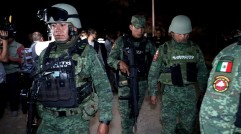Virginia Gunman Who Shot WDBJ Reporter and Cameraman Accused Reporter of Making Racist Remarks
Authorities say they have learned more about Virginia gunman Vester Lee Flanagan II's motive to kill a Virginia-based reporter and cameraman during a live news segment on Wednesday morning.
Police say that the vicious TV news veteran gunned down WDBJ-TV reporter Alison Parker, 24, and cameraman Adam Ward, 27, as they were conducting a live interview in Franklin County around 6:45 a.m. Wednesday. Video footage shows that Flanagan walked towards the victims and opened fire while Parker was speaking with a woman about tourism at the Bridgewater Plaza.
Flanagan, a 41-year-old African-American reporter known professionally as Bryce Williams, then fled the scene and committed suicide a few hours later. Officials say that he had also worked for WDBJ, which serves the Roanoke-Lynchburg market, before being fired from the station two years ago.
Virginia Gov. Terry McAuliffe described Flanagan as a "distraught" and disgruntled former employee at the local news station. The shooter appeared to justify the shootings on his social media pages, accusing the reporter of making racist comments about him and the cameraman of reporting him to human resources.
Documents show that Flanagan had complained to management at WDBJ about the victims, who were both white. In one compliant, he accused Parker of being a racist when she used the word "swinging" and the phrase "going out in the field" while she was interning at the station.
"One was something about 'swinging' by some place; the other was out in the 'field,' " reads the report, which was filed in February 2013, one month before Flanagan was fired, according to The New York Post. The document was part of his unsuccessful discrimination lawsuit against the station.
Although Parker was never disciplined for her remarks, Flanagan revealed on social media that he had not forgotten what she said.
"Alison made racist comments," Flanagan posted while he was on the run.
"They hired her after that??" he tweeted.
According to Ryan Fuqua, a video editor at WDBJ, Flanagan had a twisted mind and misconstrued common words as racist remarks.
"That's how that guy's mind worked. Just crazy, left-field assumptions like that," Fuqua told The Post.
"[Those words are] just common, everyday talk. [But] that was his MO - to start sh *t," Fuqua explained. "He was unstable. One time, after one of our live shots failed, he threw all his stuff down and ran into the woods for like 20 minutes."
Trevor Fair, a 33-year-old cameraman who worked at WDBJ for six years, said that common words Parker used routinely set Flanagan off.
"We would say stuff like, 'The reporter's out in the field.' And he would look at us and say, 'What are you saying, cotton fields? That's racist,'" Fair recounted. "We'd be like, 'What?' We all know what that means, but he took it as cotton fields, and therefore we're all racists."
"This guy was a nightmare," Fair added. "Management's worst nightmare."
Flanagan also assumed that a manager was being racist when he brought in watermelon for all of the employees.
"Of course, he thought that was racist. He was like, 'You're doing that because of me.' No, the general manager brought in watermelon for the entire news team. He's like, 'Nope, this is out for me. You guys are calling me out because I'm black.'"
In addition, Jeffrey Marks, the general manager of WDBJ, described the shooter as "an unhappy man" who "had a reputation for being difficult to work with," reports ABC News.
Subscribe to Latin Post!
Sign up for our free newsletter for the Latest coverage!
* This is a contributed article and this content does not necessarily represent the views of latinpost.com














